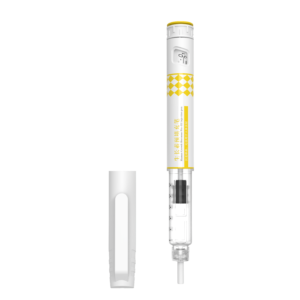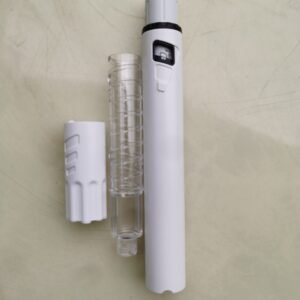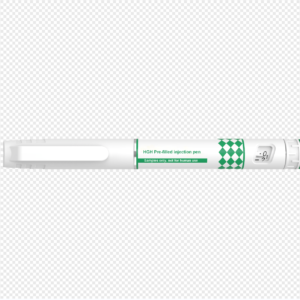Reusable Insulin Pens
Reusable insulin pens represent a significant advancement in diabetes management, offering a practical and efficient solution for insulin delivery. These devices are designed to be used multiple times, with replaceable insulin cartridges that are inserted into the pen. This makes them an eco-friendly and cost-effective alternative to disposable insulin pens and traditional syringe methods.
One of the primary purposes of reusable insulin pens is to provide patients with a more convenient and precise method of administering insulin. Unlike traditional syringes, which require drawing insulin from a vial, reusable insulin pens allow users to easily dial and inject the exact dose needed. This precision can lead to better glycemic control and overall diabetes management.
Reusable insulin pens differ from their disposable counterparts in several key ways. While disposable pens are pre-filled with insulin and discarded once empty, reusable pens are equipped with a durable mechanism that can be used indefinitely. Only the insulin cartridges need to be replaced, reducing waste and potentially lowering long-term costs for patients. Additionally, reusable pens often feature advanced technology, such as memory functions to track dosage history and digital displays for easier reading.
The adoption of reusable insulin pens has been growing steadily in modern diabetes care. This trend can be attributed to several factors, including increased awareness of environmental sustainability and the rising cost of medical supplies. Patients and healthcare providers alike appreciate the convenience, accuracy, and long-term savings that these devices offer.
Furthermore, the development of reusable insulin pens has been driven by advancements in medical technology and engineering. Many of the latest models incorporate user-friendly designs and features that enhance the overall experience for individuals managing diabetes. As a result, reusable insulin pens are becoming an integral part of diabetes care, offering a reliable and sustainable solution for insulin delivery.
Benefits of Using Reusable Insulin Pens
Reusable insulin pens offer a multitude of benefits that make them a preferred choice for many diabetic patients. One of the primary advantages is the convenience they provide. Unlike traditional syringes, reusable insulin pens are designed to be portable and easy to use, making them ideal for those with active lifestyles. The compact design allows users to carry them discreetly, facilitating insulin administration at any time and place.
Another significant benefit is cost-effectiveness. Although the initial investment in a reusable insulin pen may be higher compared to disposable options, the long-term savings are substantial. The need to purchase only the insulin cartridges rather than entire pens reduces recurring expenses. This makes reusable insulin pens an economical choice for both patients and healthcare providers.
Environmental benefits are also noteworthy. Reusable insulin pens generate less medical waste compared to disposable pens and syringes. This reduction in waste contributes positively to environmental sustainability by minimizing the volume of non-biodegradable materials that end up in landfills.
Dosage accuracy is a critical factor in effective diabetes management, and reusable insulin pens excel in this area. These devices are equipped with precise dosing mechanisms that allow users to administer the exact amount of insulin needed. This precision helps in maintaining better glycemic control, reducing the risks associated with incorrect dosing such as hypoglycemia or hyperglycemia.
Additionally, the user-friendly design of reusable insulin pens enhances their appeal. Features such as ergonomic grips, easy-to-read dose displays, and audible clicks during dose setting make them accessible to a wide range of users, including those with visual impairments or dexterity issues. This intuitive design simplifies the process of insulin administration, thereby improving adherence to prescribed treatment regimens.
In summary, the convenience, cost-effectiveness, environmental benefits, dosage accuracy, and user-friendly design of reusable insulin pens make them a superior option for diabetes management. These advantages collectively contribute to improved patient outcomes and a higher quality of life for individuals living with diabetes.
How Reusable Insulin Pens Work
Reusable insulin pens are designed to offer an efficient and convenient way for individuals with diabetes to administer their insulin doses. Their functionality revolves around a few key components: the cartridge, needle, and dial. Understanding the mechanics of these parts is crucial for proper usage and optimal performance.
The cartridge is a replaceable container that holds the insulin. It is inserted into the pen and can be replaced once the insulin is depleted. The needle, which is attached to the end of the pen, is used to inject the insulin into the body. Needles are typically disposable and need to be changed regularly to ensure hygiene and effective delivery.
The dial is a critical component that allows the user to set the desired dose of insulin. By rotating the dial, the user can adjust the amount of insulin to be administered. This feature provides precision and ease of use, allowing for accurate dosing according to individual needs.
Here is a step-by-step guide on how to use a reusable insulin pen:
Step 1: Prepare the Pen
Start by washing your hands thoroughly. Remove the cap of the pen and check that the insulin cartridge is properly inserted. If the cartridge is empty or nearly empty, replace it with a new one.
Step 2: Attach the Needle
Remove the protective seal from a new needle and screw it onto the pen. Remove the outer needle cap and set it aside, then remove the inner needle cap and discard it.
Step 3: Prime the Pen
Before injecting, it is essential to prime the pen to remove any air bubbles. Dial a small dose (usually 1-2 units) and press the injection button while pointing the needle upwards. You should see a drop of insulin at the needle tip, indicating the pen is primed.
Step 4: Set the Dose
Rotate the dial to select your prescribed dose. Double-check the dose to ensure accuracy.
Step 5: Administer the Injection
Choose an injection site (typically the abdomen, thigh, or upper arm). Clean the area with an alcohol swab. Insert the needle into the skin at a 90-degree angle and press the injection button completely. Hold the pen in place for a few seconds to ensure full delivery of the insulin.
Step 6: Remove and Dispose of the Needle
After the injection, remove the needle from the pen and dispose of it in a sharps container. Replace the pen cap and store the pen as instructed by the manufacturer.
By following these steps, users can effectively manage their insulin therapy with the help of reusable insulin pens, ensuring both convenience and precision in their diabetes care routine.
Types of Reusable Insulin Pens
Reusable insulin pens are an essential tool for individuals managing diabetes, providing convenience, accuracy, and cost-effectiveness. Several types of reusable insulin pens are available on the market, each designed to cater to various user needs and preferences. Popular brands such as Novo Nordisk, Sanofi, and Eli Lilly offer a range of models, each with unique features that enhance user experience and efficacy.
One of the leading models is the NovoPen series by Novo Nordisk, known for its durability and precision. The NovoPen Echo and NovoPen 5 are prominent in this lineup. The NovoPen Echo is designed for children and visually impaired users, featuring half-unit dosing increments and a memory function that records the last dose and time. The NovoPen 5, on the other hand, is favored for its robust build and reliability, suitable for adult users who require consistent and accurate dosing.
Sanofi’s AllStar Pro is another noteworthy insulin pen, particularly valued for its compatibility with a wide range of insulin cartridges. The AllStar Pro is lightweight and easy to use, making it ideal for users who prioritize portability and ease of administration. Its intuitive design ensures a smooth delivery process, minimizing discomfort during injections.
Eli Lilly offers the HumaPen Luxura HD, a sophisticated option for users who require precise dosing. This pen delivers insulin in half-unit increments, making it an excellent choice for those needing fine-tuned control over their insulin intake. The HumaPen Luxura HD is also known for its ergonomic design, providing a comfortable grip and ease of use.
Comparing these popular reusable insulin pens highlights their distinct features and suitability for different needs. The NovoPen Echo is perfect for young and visually impaired users, while the NovoPen 5 serves adult users well. The AllStar Pro offers versatility and portability, and the HumaPen Luxura HD provides precision and comfort. Understanding these differences can help users select the most appropriate pen for their specific requirements, ensuring effective diabetes management.
Choosing the Right Reusable Insulin Pen for You
When selecting the most suitable reusable insulin pen, it is essential to consider various factors that align with your individual needs and lifestyle. One crucial aspect is the type of insulin you require. Different pens are designed for specific insulin types, including rapid-acting, long-acting, and intermediate-acting insulin. Ensuring compatibility between the pen and your prescribed insulin is vital for effective diabetes management.
Dosage requirements also play a significant role in choosing the right insulin pen. Some pens offer fixed doses, while others provide variable dosing options. If your insulin dosage needs to be adjusted frequently, a pen with flexible dosing capabilities might be more appropriate. Additionally, certain pens come with memory functions that record previous doses, which can be beneficial for tracking and maintaining accurate insulin administration.
Ease of use is another critical consideration. Reusable insulin pens should be user-friendly, especially for individuals with dexterity issues or visual impairments. Features such as easy-to-read displays, audible clicks, and ergonomic designs can enhance usability. Some pens are equipped with digital interfaces, providing a more intuitive experience for tech-savvy users.
Personal preferences and lifestyle factors should not be overlooked. The size and portability of the insulin pen can impact your daily routine, particularly if you lead an active lifestyle or travel frequently. Additionally, aesthetic preferences, such as pen color and design, might influence your choice. Selecting a pen that fits comfortably into your daily life can encourage consistent use and adherence to your insulin regimen.
Consulting with healthcare providers is crucial when making an informed decision about reusable insulin pens. Healthcare professionals can offer personalized recommendations based on your medical history, insulin needs, and lifestyle. They can also provide training on proper pen usage and maintenance, ensuring you use the device safely and effectively.
Maintenance and Care of Reusable Insulin Pens
Ensuring the longevity and optimal performance of your reusable insulin pen requires consistent maintenance and proper care. First and foremost, it is essential to clean your insulin pen regularly. Use a soft, damp cloth to wipe the exterior of the pen, being cautious to avoid getting any moisture into the cartridge compartment or the needle area. Do not use alcohol or any other harsh cleaning agents, as these can damage the pen’s components.
Storage is another critical aspect of maintaining your reusable insulin pen. Store the pen in a cool, dry place away from direct sunlight and extreme temperatures. If the pen will not be used for an extended period, it is advisable to remove the cartridge to prevent leakage or potential damage. Always keep the pen cap on when not in use to protect the needle and keep it sterile.
Handling the insulin pen with care is equally important. Avoid dropping the pen or subjecting it to any form of impact, as this can impair its functionality. When replacing cartridges, ensure that you follow the manufacturer’s instructions carefully. Insert the new cartridge gently and securely to avoid any leaks or malfunctions.
Replacing needles is a straightforward but crucial task. Always use a new, sterile needle for each injection to prevent infection and maintain the effectiveness of the insulin delivery. Dispose of used needles safely in a designated sharps container.
Common issues such as blocked needles or inconsistent insulin flow can often be resolved through simple troubleshooting steps. If you experience a blocked needle, try using a new needle or gently priming the pen to clear the blockage. For inconsistent insulin flow, ensure that the cartridge is properly installed and that there are no visible air bubbles.
Adhering to these maintenance and care guidelines will help ensure that your reusable insulin pen remains in optimal condition, providing you with reliable and effective diabetes management. Regular checks and mindful handling can significantly extend the lifespan of your pen, making it a dependable tool in your diabetes care regimen.
Safety and Precautions
When using reusable insulin pens, adhering to crucial safety considerations and precautions is essential to ensure effective diabetes management and to avoid potential complications. One of the primary concerns is preventing infections. To minimize this risk, always use a new needle for each injection and avoid sharing your insulin pen with others. Proper hygiene practices, such as washing hands before handling the pen and cleaning the injection site, are also recommended.
Accurate dosage administration is another critical aspect when using reusable insulin pens. Regularly check that the pen is functioning correctly and that the insulin cartridge is properly inserted. Always prime the pen before each injection to remove any air bubbles, which can cause inaccurate dosing. It is advisable to double-check the dosage dial to ensure that the correct amount of insulin is being administered.
Recognizing signs of malfunction or damage in your reusable insulin pen is vital. Common indicators include difficulty in pressing the injection button, leakage of insulin, or visible cracks in the pen. If you encounter any of these issues, discontinue use immediately and consult with your healthcare provider for guidance. Additionally, keep spare insulin pens or cartridges on hand as a backup in case of pen failures.
In emergencies or pen failures, having a clear action plan is crucial. Familiarize yourself with alternative methods of insulin administration, such as using a syringe, and ensure that you have the necessary supplies readily available. Inform family members or caregivers about your diabetes management routine and emergency procedures to ensure they can provide assistance if needed.
By adhering to these safety measures and precautions, users of reusable insulin pens can effectively manage their diabetes while minimizing potential risks. Regular consultations with healthcare professionals can further enhance the safe and effective use of these devices.
Future Trends and Innovations in Reusable Insulin Pens
As the landscape of diabetes management continues to evolve, significant advancements in reusable insulin pens are on the horizon. These innovations aim to enhance patient experience, improve adherence to treatment regimens, and provide more precise insulin delivery. One of the most notable trends is the development of smart insulin pens. Equipped with digital tracking features, these pens can monitor insulin doses, log injection times, and sync data with mobile health applications. This integration not only facilitates better self-management for patients but also allows healthcare providers to track and adjust treatment plans more effectively.
Another promising innovation is the incorporation of artificial intelligence (AI) and machine learning algorithms into reusable insulin pens. These technologies can analyze a patient’s historical data to predict optimal insulin dosages, thereby reducing the risk of hypo- or hyperglycemia. Additionally, some emerging models include real-time glucose monitoring capabilities, offering a comprehensive solution for diabetes management within a single device. This convergence of technologies is expected to significantly simplify the daily routines of individuals with diabetes, making it easier to maintain stable blood glucose levels.
Insights from industry experts suggest that the future of reusable insulin pens will also see advancements in materials and design. Newer models are likely to be more ergonomic, user-friendly, and environmentally sustainable. Biodegradable and recyclable components may become standard, addressing environmental concerns associated with medical waste. Moreover, continuous research and development efforts are expected to lead to pens that are more affordable, thereby increasing accessibility for a broader population.
In summary, the future of reusable insulin pens is poised for transformative changes driven by technological advancements and innovative design. These developments promise to provide more effective and convenient diabetes management solutions, ultimately improving the quality of life for millions of individuals worldwide.

























Reviews
There are no reviews yet.